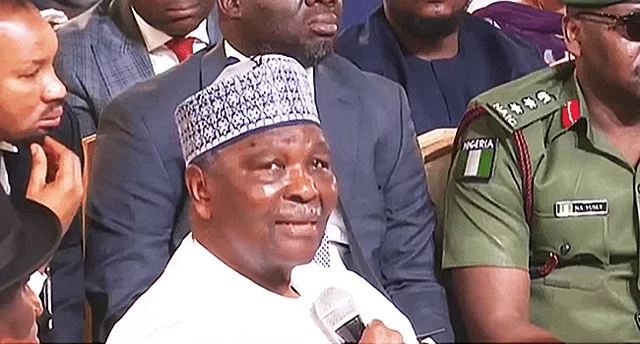By The9jaTREND
Former Nigerian Head of State, General Yakubu Gowon (Rtd.), has stated that the chapter of military governance in Nigeria must be permanently closed, stressing that democracy, despite its flaws – remains the best path to national development.
Gowon made the statement in Abuja during the unveiling of a new book, “Military Factor in Nigerian History, 1960-2018”, published by the Historical Society of Nigeria (HSN) in celebration of the organisation’s 70th anniversary.
The event brought together academics, military officials, and political figures for a critical reflection on the role of the military in Nigeria’s historical trajectory.
While acknowledging the military’s contributions to peacekeeping, infrastructure development, and national unity – especially during the Nigerian Civil War – Gowon stated emphatically that the military must no longer play any role in governance or politics.
According to him, “The era of military governance is and must remain behind us. Democracy, despite its imperfections, provides the best framework for national development and popular participation. The armed forces must fully embrace their constitutional role as defenders of the nation’s territorial integrity, not as administrators or political actors.
The former head of state, who chaired the book presentation, described the military’s legacy as complex and layered, noting that its history is neither entirely heroic nor villainous.
While responding to the long-standing debate over whether the military has been a force for progress or regression in Nigeria, Gowan said, “With the wisdom that comes from age and reflection, I believe the answer lies somewhere in between.”
He highlighted the military’s success in quelling civil strife, creating states to decentralise governance, and restoring order when democratic institutions collapsed. He also credited Nigeria’s armed forces for leading peacekeeping missions across Africa and beyond.
Yet, he did not shy away from addressing the darker periods of military rule. “Military regimes stifled democratic development, violated civil liberties, and in some cases, fostered corruption,” he admitted.
Referencing the coups of 1966 and 1983 and the annulment of the June 12, 1993, presidential election, Gowon said these events remain painful reminders of Nigeria’s turbulent political past.
“These interruptions in our democratic journey represented dark chapters in our history. But by acknowledging these mistakes, we pave the way for a brighter, more democratic future,” he stated.
Gowon also revisited the Nigerian Civil War, calling it “the most painful episode in Nigeria’s history.” However, he said the conflict reaffirmed the nation’s dedication to unity.
Turning to present-day security challenges, Gowon emphasised the need for an intelligence-driven and technologically capable military. He called for deeper integration between the armed forces and civilian institutions, insisting the military must operate as part of the larger national framework.
“The military should not stand apart from the people but be seen as an essential component of the national fabric, working in tandem with civilian authorities,” he advised.
He concluded by encouraging the Nigerian military to continue strengthening its role in regional security while enhancing national defence capabilities
